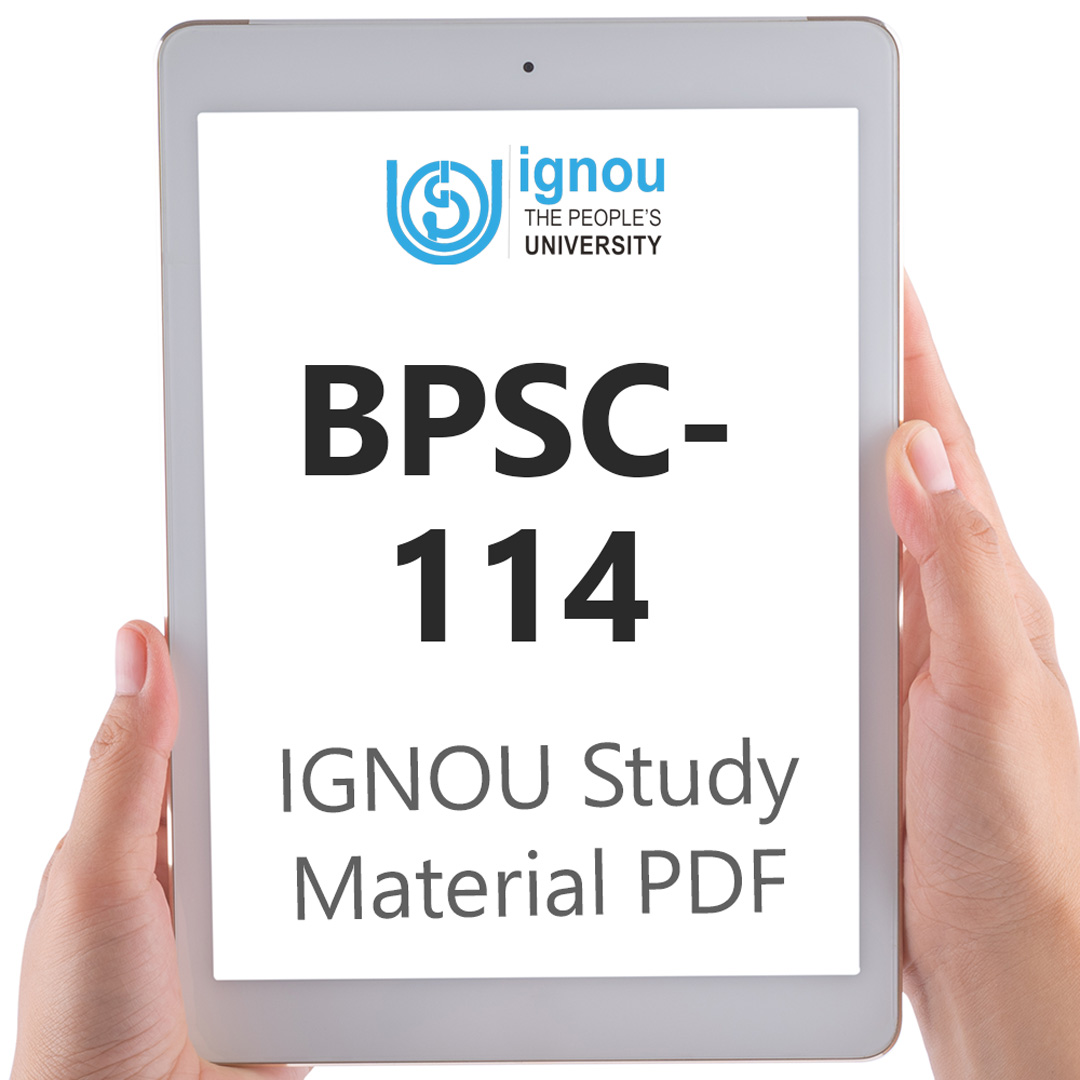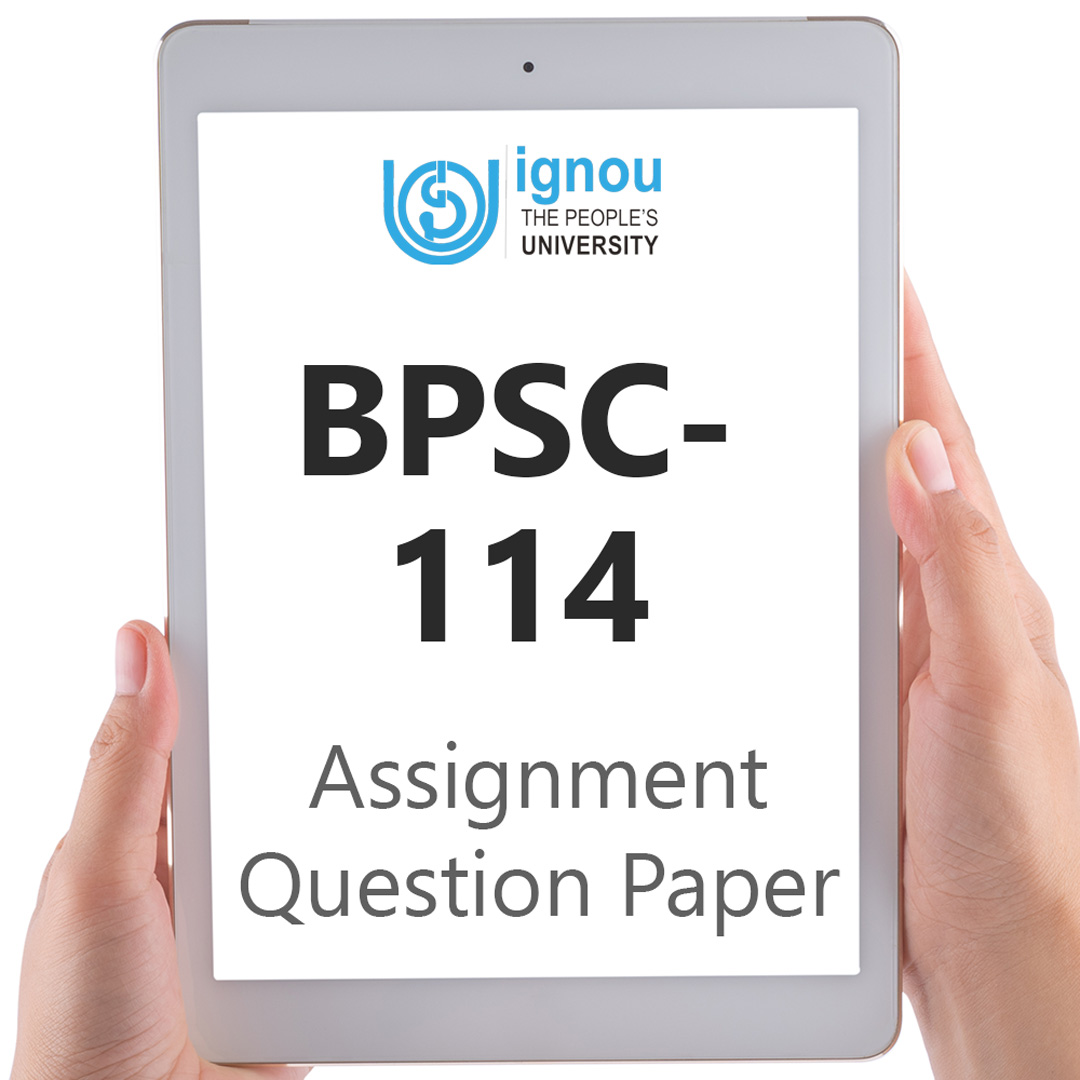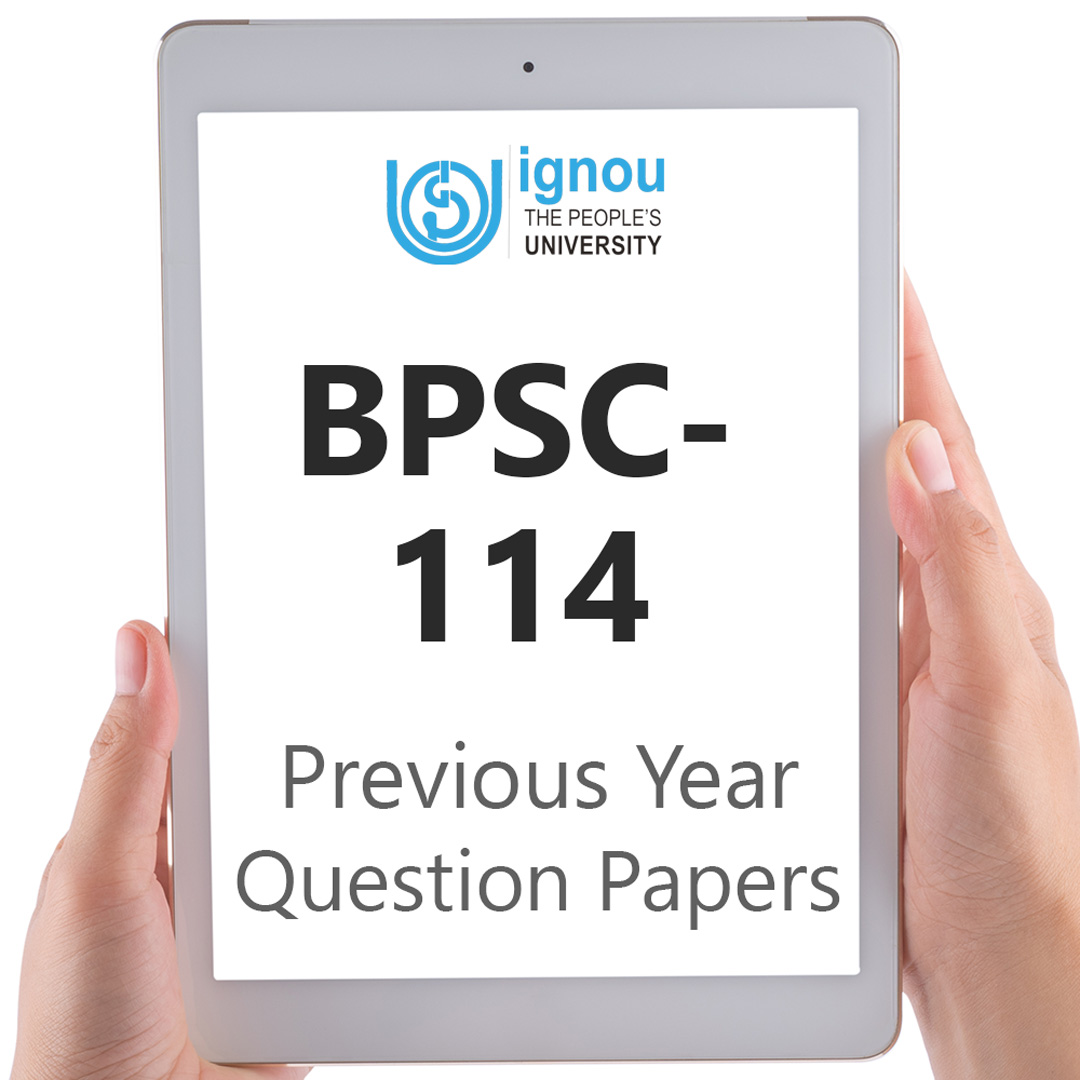If you are looking for BPSC-114 IGNOU Solved Assignment solution for the subject Indian Political Thought-II, you have come to the right place. BPSC-114 solution on this page applies to 2022-23 session students studying in BAPSH courses of IGNOU.
BPSC-114 Solved Assignment Solution by Gyaniversity
Assignment Code: BPSC-114/ASST/TMA/2022-23
Course Code: BPSC-114
Assignment Name: Indian Political Thought - II
Year: 2022-2023
Verification Status: Verified by Professor
Assignment - I
Answer the following in about 500 words each.
Q1) Trace the genesis of Modern Indian Political Thought. 20
Ans) By the third quarter of the 19th century, there was no significant existential threat to British colonialism in India, and their dominance was well established. As they began to solidify their colonial control, they needed the backing of the Indian subjects. For this, the British established two classes: one of educated urban landlords who worked in colonial administration, and the other. They intended to use the educational system to solidify their cultural dominance.
The British imperialists took three measures to impose their way of life on India:
First, they unified the entire nation's administration.
Second, a system of education in English was formed.
Third, the British also attempted to demonstrate the inferiority of Indian culture through anthropological and archaeological studies.
Modern Indian political philosophy first appeared in this politico-sociocultural context.
Changes in social, political, economic, and cultural facets of our unique nation were brought about by India's protracted war for independence from British control. When India had a variety of responses to British colonialism in the 18th and 19th centuries, modern Indian political theory emerged. Modern Indian political thinking and the Indian Renaissance both arose at the same time. Given that Calcutta was an earlier centre of British authority, Bengal was inherently prepared to play a larger part in the reawakening of India. Here, the first institutions, schools, and media were established. Bengal was keen to seize new prospects due to its vibrant population and comparably prosperous economic and agricultural area. Bengal was the home of a sizable portion of India's liberation warriors.
A portion of Indians who were profoundly touched by the issues afflicting Indian society at the time and were committed to solve them experienced an intellectual reawakening. It was a time of cultural decline because there was less demand for creativity and critical thought. In India, renaissance did not imply a return to ancient customs but rather a strengthening of current ones while taking a reasonable approach to them. Instead of restoring the past, it was more of an intellectual and cultural rediscovery. The historical background of the Indian reawakening made it simpler to accept ideas and notions that were comparable to those of the West.
The West's modernist spirit and colonialism were at odds with one another. Modernity advocated for universal freedom, whereas colonialism was opposed to it because it favoured subservience and hierarchy. It has been noted that the British did not desire the modernization of India; rather, they desired the continuation of India's mediaeval culture because this was essential to the maintenance of British control in India. It should be noted that the enlightenment, which began in Europe in the 18th century, did give rise to arguments for the superiority of the European race over other civilisations. Modern Indian political intellectuals attempted to criticise Western civilization in addition to instilling pride in Indians by stressing their rich cultural history.
Q2) Discuss Raja Rammohan Roy’s reformist efforts in education. 20
Ans) Rammohan's ideas for modern education depended on using English as a medium of instruction more frequently; in this context, the language itself was not as significant as its role in transmitting practical current knowledge. Although knowledge could be shared through the vernacular language, he was obligated to prefer English-medium instruction given his interests in mathematics, natural philosophy, chemistry, anatomy, and other relevant sciences. Rammohan had aims that were obviously distinct from those of Macaulay, who promoted an education that was primarily literary while being on the Anglicists' side. He took the issue of strengthening vernacular, which he saw as a means of spreading important information to his locals for their awareness, with the same seriousness. He wrote just as much in Bengali as he did in English.
Raja Rammohan Roy established a free English school at Suripara in 1816. With the support of Chief Justice Sir Hyde East, David Hare, Raja Rammohan Roy, and Baidanath Mukherjee proposed the idea of founding a college to instruct the sons of notable Hindus in English and Indian languages as well as Asian and European literature and science in 1817. Rammohan Roy encouraged Christian missionaries to teach people English.
The monotheistic tenor of Vedanta strongly impacted Raja Rammohan Roy, who later founded the Vedanta College in 1825 to impart its teachings. He was equally aware of the value of European literature and science. Therefore, he included European Science and learning in that college. He rendered the Upanishad and Vedanta into Bengali. In the Vedanta Grantha, Raja Rammohan Roy's first Bengali publication, he discussed the limitations of Bengali writing at the time.
He encouraged the use of Hindi in addition to Bengali. He thought that Hindi is more practical for daily work than Sanskrit. More than five Upanishads were translated into Hindi by him. He began his career as a journalist and published publications in both Bengali and Hindi. He was appropriately referred to as the Erasmus of India since he wished to educate his people about a brand-new, contemporary form of education. In order to revive eastern learning, Raja Rammohan Roy criticised the Company's approach of creating Sanskrit Colleges. Although he was a proponent of the ancient language Sanskrit, he had never agreed with its educational approach.
Rammohan Roy continued to work on his journalism projects as well. Raja Rammohan Roy, also known as the Moon of intelligence, founded the first Bengali newspaper, Sambad Kaumudi, in 1821. It was produced in the native tongue for the natives. It developed into a crucial tool for disseminating his Sati theories. Raja Rammohan Roy believed that the Indians learned about British laws and customs through newspapers and were better able to talk about the excellent kind of administration the British had constructed. According to Raja Rammohan Roy, that press ordinance was sufficient to keep the locals in the dark, ignorant, and in a precarious situation.
People have always expressed their protest against the governing authorities when they were ignorant or uneducated. A wise individual would never unnecessarily vent their anger against the dominant race. Raja Rammohan Roy's Memorial to the King-in-Council, an appeal, was written in England, where it had a significant impact on the liberal circles of the day. The pursuit of press freedom was the last step.
Assignment - II
Answer the following questions in about 250 words each.
Q1) Write a note on Pandita Ramabai’s contribution to feminist thought. 10
Ans) An intelligent Sanskrit scholar known as a Pandita Ramabai fearlessly revolted against her ancestral religion by marrying a member of a lower caste and by converting to Christianity. She rebelled against Hinduism due of its gender-specific societal ills. She is regarded as an activist who strove to improve the miserable conditions of women and an unwavering champion against harmful societal practises. Ramabai's main goals were to end systemic discrimination and the physical limitations that women faced. She firmly thought that because of their responsibilities in sexuality, reproduction, and domesticity, women were restricted to domestic settings as merely spouses, sisters, and mothers. They were denied the chance to achieve self-actualization as a result.
Women who were widowed, had no children, or had only daughters were treated differently and had lower social statuses. She spent her entire life working for the iconic stereotype of Indian high caste widows. In Indian civilization, widows experienced dehumanising treatment and a lower position that was sanctified by rituals, holy books, and religious literature. Ramabai advocated that these women should be rescued from their horrifying domestic situations and placed in the public domain through education, vocational training, and financial independence.
Ramabai developed into a fervent proponent of late marriages and marriages of choice, but she never overtly advocated for second marriages. Women's education was the only focus of Ramabai's efforts since she firmly thought that it could set them free from the chains of patriarchy and religious rigidity. A prime example of caste and gender inequality being rejected is Ramabai's Mukti Sadan. Her impassioned pursuit to fight for women's education and institutional reaction to fight for women's socio-economic liberation are indelible in the history of feminist thinking. She articulated women's causes and concerns, particularly Hindu widows.
Q2) Discuss Swami Vivekananda’s Vies on religion. 10
Ans) He gained fresh experiences on his protracted trek from the Himalayas to Cape Comorin, where he also learned about the socioeconomic and religious circumstances of his fellow compatriots. He also came to see that human misery, social ills, and India's decline are caused by religious dogma, superstitions, and a loss of faith in spirituality. Despite his unwavering devotion to religion, he did not appreciate any kind of orthodoxy in religious matters. He also disagreed with those who said that religion was to blame for India's social decline and political exploitation. In addition, he denounced "don't touchism."
Vivekananda believed that religion was essential to human existence and was both inevitable and necessary. Religion is a result of man's desire to encounter phenomena that lie outside the realm of his or her own perception and senses. Each religion, according to him, typically comprises of three elements: its values and philosophy, its mythology, and its rituals. The latter two may vary from religion to religion, but not in terms of its philosophy and values, which can promote harmony and unity. In a way, the spiritual fusion of humanity was the goal of all religions.
Additionally, he claimed that “religion is the notion that is raising the beast unto man, and man unto God.” In other words, he believed that religion embodied human nature at its core and brought people together. He therefore made an effort to impart the universal religion of man as well as the values of love and tolerance to the populace. His faith that God makes Himself known through all living things gave rise to the concept of universal religion.
Q3) Examine Gandhi’s concept of Swaraj. 10
Ans) Swaraj fought for a nation's freedom from British domination. Swaraj used a more general definition of human emancipation. According to Gandhi, the concept of Swaraj would only materialise if everyone was convinced that it could only be achieved through the use of the truth and non-violence.
Swaraj also denoted political independence or freedom, but it never referred to a system modelled after Western democracies. Gandhi was referring to Ramrajya, popular sovereignty based only on moral law. People would eventually learn to control themselves and stop needing government representatives. He referred to this idea of universal freedom as Sarvodaya. Gandhi favoured law-abiding, engaged individuals who would support democracy. In addition to choosing their representatives, the populace would also serve as a check on any potential abuse of authority on their part.
There was an economic component to Swaraj. It attempted to provide favourable circumstances for the improvement of all the underprivileged and destitute people. According to Gandhi, the village economy had two fundamental goals. While also ensuring freedom, justice, and equality, it would also give communities a source of income and employment.
Gandhi's concept of swaraj, also known as self-control or self-regulation, had a spiritual component. To gain true independence, internal barriers must be removed. The Western civilization served as a metaphor for illusionary happiness and dependence that can never materialise. Additionally, it would prevent the development of self-realization. Gandhi promoted truth, non-duality, advaita, and self-rule. Gandhi's notion of Swaraj was centred on the person, therefore in order to achieve the genuine meaning of Swaraj, everyone had to practise self-control.
Assignment - III
Answer the following questions in about 100 words each.
Q1) Elaborate upon Tagore’s critique of nationalism. 6
Ans) In India, anti-colonial struggle that turned into chauvinistic nationalism worried Tagore. He saw the dangers of nationalism based on the Western idea of a nation state. In his pleas to the Japanese to abstain from violence, Tagore said that the chauvinistic nationalism that had grown in the West was to blame for the war in Europe. The idea that the contemporary nation-state model created in Europe should be adopted worldwide was rejected by Tagore. He argued that the nation-state was completely alien and hostile to the cultural traditions of the East, claiming that it was a by-product of the unique history of European nations. Even the national movement for emancipation from British colonial control was insufficient in Tagore's eyes to support the nation-form as a representation of liberty.
Q2) What were Jawaharlal Nehru views on Socialism? Explain. 6
Ans) Jawaharlal Nehru firmly believed in scientific culture and was convinced that methodologies and a pro-science attitude have changed, renewed, and revolutionised human life while also creating opportunities for new scientific discoveries. Additionally, Nehru's outlook on life was grounded in science. He therefore argued that while widespread application of science and technology alone wouldn't always result in economic development, "progressive ideals" combined with scientific advancement were crucial for all-around development. He also argued that the nation's socioeconomic progress was significantly hampered by religious and superstitious belief systems. He was a socialist, although he did not adhere to any dogmas, it may be said.
Q3) Write a note on Lohiya’s views on Socialist Democracy. 6
Ans) Lohiya’s views on Socialist Democracy are as follows:
Justice and equality to the fullest extent possible.
A good level of life will tend to create perfect harmony between a person's material and moral requirements while avoiding the double impasse of capitalism and dialectical materialism.
a method of industrial and agricultural production with wise planning, subjected to man and promoting his full physical, intellectual, and moral growth.
The limiting of bureaucracy through the promotion of collaboration in all domains, notably in the production, distribution, and consumption of national produce, and the decentralisation of political and economic authority to make it easily accessible to the average person.
Q4) What did Iqbal have to say about modernity? Elaborate. 6
Ans) Iqbal expressed his criticism from the perspective of a Muslim philosopher who found in Islam cultural, ethical, and political resources that may promote the emergence of men with greater consciousness. He supported the universality of Islamic ethics. He opposed keeping religion in the home and maintained that Islam provided moral guidelines for civic society, politics, and the economy.
He acknowledged the importance of material developments in science and industry but emphasised that spiritual experience was an equally important aspect of a person's consciousness and that Islam provided the ethics to restrain a materialism that was out of control. Iqbal believed that modern legislatures would be the most effective at achieving his goal of a political system founded on spiritual ideas. He also advocated representative democracy. Iqbal believed that socialism may provide an effective remedy for the exploitation and inequality that resulted from unrestrained capitalism and open markets.
Q5. Examine Savarkar’s View on Nationalism. 6
Ans) The ethical, moral, and spiritual freedom of the individual was at the centre of Gandhi's concept of Swaraj, which was distinct from Savarkar's conception of Swaraj. There was a certain type of push to the martialization of the people, which in his opinion had gone weak, virile, and impotent with ideals of non-violence. He was a supporter of militarisation and the need for mandatory military training of the youth on numerous occasions. Savarkar's social and political ideas were rooted in a deeper understanding of history, which was filled with examples of valour and strength that should be imitated. A prominent theme in Savarkar's imagination is that of the country as a Hindu Rashtra.





